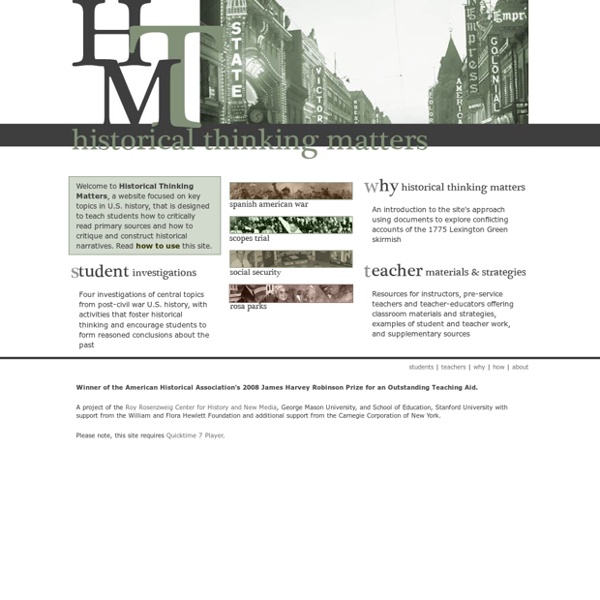



http://historicalthinkingmatters.org/
Presidential Inaugurations: Words and Images George Washington, First Inauguration April 30, 1789 Thomas Jefferson, First Inauguration March 4, 1801 Andrew Jackson, First Inauguration March 4, 1829 William Henry Harrison, Inauguration March 4, 1841 James Buchanan, Inauguration March 4, 1857 Abraham Lincoln, First Inauguration, March 4, 1861
Center for History and New Media Sea of Liberty Providing interactive tools for teaching, exploring, and sharing the power of Jefferson’s ideas across cultures and borders. Learn More | Visit the Site 100 Leaders Encouraging exploration of leadership and legacy in world history through voting, classroom activities, and teaching resources. Learn More | Visit the Site
History: Free Courses Advertisement Get free History courses online from the world's leading universities. You can download these audio & video courses straight to your computer or mp3 player. For more online courses, visit our complete collection, 1,250 Free Online Courses from Top Universities. Bookmark our collection of free online courses in History. For a full lineup of online courses, please visit our complete collection of Free Online Courses. 63 EdTech Resources You May Have Missed–Treasure Chest, Feb. 6, 2011 Here is this week’s edition of Treasure Chest–63 EdTech Resources You May Have Missed. I know, that’s a lot! What’s funny though is that I thought this week would bring my fewest number of resources. Due to time constraints this week, I didn’t think I was doing a very good job of curating resources. So what happens? I have the most ever for a Treasure Chest!
Using Historiography to Analyze the Mexican-American War Many students think of history as monotonous lectures, boring textbook readings, and a series of names and dates to memorize for a test. Students rarely learn about the concept of historiography, the study of how history has been written and how social change has influenced the way that people perceive historical events. Analyzing textbooks from a historiographical stance allows students to see that history is more about interpretation, perspective, and bias than about rote memorization. By looking at how textbooks from different eras describe a certain event, such as the Mexican-American War, students learn about the choices that textbook authors make. For example, do the textbooks depict the U.S. as the aggressor, as an unwilling participant forced into a conflict by enemy antagonism, or something in between? What is it?
Teacher, with help of grandparents, collects dirt from famous places - Kearney Hub: Local News KEARNEY— One Central Elementary School teacher has little pieces of history hanging on his classroom wall. Troy Saulsbury, a fourth-grade teacher at Central and the Kearney High School tennis coach, has a collection of more than 50 clear capsules that contain dirt from every state. Most of that dirt came from historically significant locations. An online service is needed to view this article in its entirety. You need an online service to view this article in its entirety.
American Experience Gallery | Wartime posters from the German and U.S. home fronts >> Diary | Explore Goebbels' views over nearly two decades >> Interview | A historian talks about the Third Reich and more >> Watch on PBS watch the promo check local listings Mondays 9/8 C How To Promote Your Virtual Event On Twitter With a rapidly growing and highly engaged user base, Twitter can be a great vehicle for driving registrations and attendance to your next virtual event. Here’s a step-by-step guide on how to get that done: Find your target audience on Twitter – first, of course, you need to define the target audience of your virtual event. Once you do, go seek them out on Twitter – you don’t need to engage with them on Twitter just yet, but you can start following them – and identify the “places” where they tend to congregate (e.g. read their tweets, click through on links they’re sharing, read their blogs, attend chats they participate in, etc.). You may find that by following folks, they’ll follow you back – and, may engage with you on their own.
Public History in Schools? Why and How? - Public History Weekly - The International Blogjournal States that have an annual “Confederate Memorial” holiday on their calendars, cities that have appointed commissions to deliberate the future of Confederate monuments in their prized public spaces, new museums that document and teach the horrors of slavery and Jim Crow America—all of these have been recent topics in public discourse in the US.[1] Whether the public visibility of these topics signal a long overdue reckoning with an ugly past, a response to outright racist rhetoric and actions, a changing media landscape, or other factors, is not clear. But what is certain is that students encounter these topics and debates as they scroll down their social media feeds and consume media. Two Models
The Best Free Documentary Websites I usually blog about web tools and mobile apps that we can use in education but since it is summer holidays now i am going to provide you with a list of free documentary websites that you can use to watch thousands of documentaries from different categories. Feel free to share the post with your friends and colleagues. Here is the list of some of the best free Documentary websites.1- Fandor Fandor is a website that offers over 2000 indie movies that you can watch right from your computer.